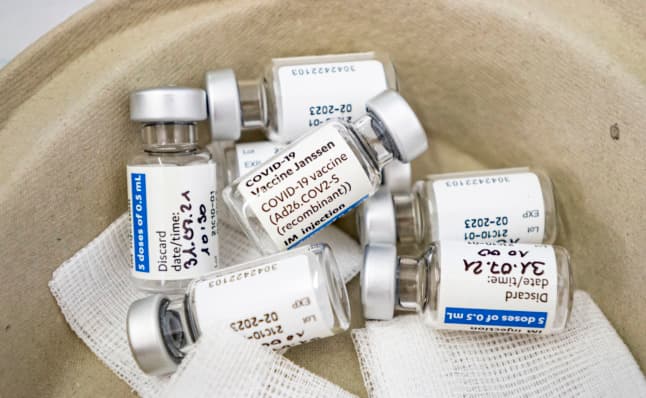German states return more than 2.7 million unused vaccine shots

Germany has seen a huge drop in demand for Covid jabs recently - and now the 16 states are set to give doses that haven't been used back to the government.
In total more than 2.7 million vaccination doses are being returned from distribution centres across Germany to the central government.
Among them are around 2.6 million doses of AstraZeneca, according to a paper by the Health Ministry which has been seen by DPA. There are also several unused Johnson & Johnson doses.
The German government has promised to give at least 30 million vaccine doses to developing countries and other regions by the end of the year.
READ ALSO: EXPLAINED: Why Covid vaccine demand is dropping in Germany
From the distribution centres, 15 of the 16 German states are now returning unused vaccines. The southwestern state of Saarland was the only state not to return extra doses to the federal government, according to the report.
The government documents revealed that 922,000 doses of the AstraZeneca vaccine alone will be returned from North Rhine-Westphalia - Germany's most populous state - along with 685,000 doses from Bavaria.
On Monday, August 9th, just 275.758 vaccine shots were administered in Germany. This is barely a fifth of the amount of shots being carried out daily at the height of the vaccination drive.
As of Tuesday, 55.1 percent of the German population were fully vaccinated, while 62.5 percent had been given their first dose.
Vaccination on the agenda at Tuesday crunch talks
Chancellor Angela Merkel will meet with 16 state leaders on Tuesday to thrash out plans for the coming weeks and months in light of a spike in Covid infection rates.
With the country's inoculation campaign grinding to a halt, Merkel's office is reportedly pushing for proposals that would incentivise people to get their shot in autumn.
These would include extending the requirement to present evidence of vaccination, recovery or a negative test in order to access a wide range of leisure activities, cultural and sports events, gastronomy and other areas of public life.
READ ALSO:
- Germany plans ‘full freedom’ for vaccinated in Covid crunch talks
- Is Germany set to introduce a nationwide ‘health pass’ system?
If the plans are carried forward, unvaccinated people would need to be tested far more regularly in order to go out to eat, visit the gym, or even visit relatives in a care home, for instance. From October, it's possible that they would also have to pay for each of these tests out of their own pocket.
But ministers will also consider plans to disallow tests as a means of entry to these venues and events, meaning people who don't get jabbed would face increasing restrictions on their daily lives.
Since opinions are divided among state leaders, these plans are likely to lead to heated discussion between the federal and state government.
Comments (1)
See Also
In total more than 2.7 million vaccination doses are being returned from distribution centres across Germany to the central government.
Among them are around 2.6 million doses of AstraZeneca, according to a paper by the Health Ministry which has been seen by DPA. There are also several unused Johnson & Johnson doses.
The German government has promised to give at least 30 million vaccine doses to developing countries and other regions by the end of the year.
READ ALSO: EXPLAINED: Why Covid vaccine demand is dropping in Germany
From the distribution centres, 15 of the 16 German states are now returning unused vaccines. The southwestern state of Saarland was the only state not to return extra doses to the federal government, according to the report.
The government documents revealed that 922,000 doses of the AstraZeneca vaccine alone will be returned from North Rhine-Westphalia - Germany's most populous state - along with 685,000 doses from Bavaria.
On Monday, August 9th, just 275.758 vaccine shots were administered in Germany. This is barely a fifth of the amount of shots being carried out daily at the height of the vaccination drive.
As of Tuesday, 55.1 percent of the German population were fully vaccinated, while 62.5 percent had been given their first dose.
Vaccination on the agenda at Tuesday crunch talks
Chancellor Angela Merkel will meet with 16 state leaders on Tuesday to thrash out plans for the coming weeks and months in light of a spike in Covid infection rates.
With the country's inoculation campaign grinding to a halt, Merkel's office is reportedly pushing for proposals that would incentivise people to get their shot in autumn.
These would include extending the requirement to present evidence of vaccination, recovery or a negative test in order to access a wide range of leisure activities, cultural and sports events, gastronomy and other areas of public life.
READ ALSO:
- Germany plans ‘full freedom’ for vaccinated in Covid crunch talks
- Is Germany set to introduce a nationwide ‘health pass’ system?
If the plans are carried forward, unvaccinated people would need to be tested far more regularly in order to go out to eat, visit the gym, or even visit relatives in a care home, for instance. From October, it's possible that they would also have to pay for each of these tests out of their own pocket.
But ministers will also consider plans to disallow tests as a means of entry to these venues and events, meaning people who don't get jabbed would face increasing restrictions on their daily lives.
Since opinions are divided among state leaders, these plans are likely to lead to heated discussion between the federal and state government.
Join the conversation in our comments section below. Share your own views and experience and if you have a question or suggestion for our journalists then email us at [email protected].
Please keep comments civil, constructive and on topic – and make sure to read our terms of use before getting involved.
Please log in here to leave a comment.